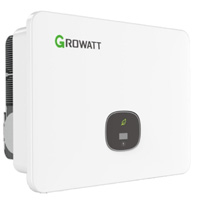An on-grid solar inverter is an essential component of an on-grid solar system that converts the DC electricity generated by the solar panels into usable AC electricity. In addition to this, the on-grid solar inverter regulates the current flow, ensuring system safety by shutting down the system in case of electrical arc or any disturbances in the power grid, optimizes and regulates the power output to deal with fluctuations, and allows two-way communication with the power grid.
All domestic and commercial solar systems come with a solar inverter. However, the solar inverter's roles and functions generally differ in on-grid and off-grid systems.
Some of the benefits of using an on-grid solar inverter include the ability to track power production, ensuring safety of the on-grid solar system, and the ability to feed excess energy to the grid and draw energy from it when needed. However, one of the cons of using an on-grid solar inverter is that the solar system will not function during a power outage.
In conclusion, on-grid solar inverters play a vital role in converting DC electricity to AC electricity and ensuring the safety and optimal functioning of on-grid solar systems. They offer several benefits, such as tracking power production and two-way communication with the power grid, but also have limitations, such as dependence on the power grid for operation.
In addition to being cost-efficient and sustainable, on-grid solar inverters offer several other benefits. One such benefit is easy maintenance. High-quality models of on-grid inverters are easy to maintain, making them an ideal choice for households and businesses alike. On-grid inverters are also easy to install, as they do not require additional equipment such as a battery bank. This makes the installation process quick and hassle-free. Another advantage of on-grid solar inverters is their ability to optimise energy production. These inverters are designed to produce the maximum amount of energy possible, ensuring that you get the most out of your solar system.
On-grid solar inverters also offer anti-islanding protection. In the event of a power outage, the on-grid inverter shuts down the power supply to the house. While this may result in a temporary loss of power, it is an important safety feature. If a lineman is working at a faulty site and your system continues to produce electricity despite the grid being shut down, the working personnel could get electrocuted. The anti-islanding feature ensures that the solar system is safely disconnected from the grid during an outage.
